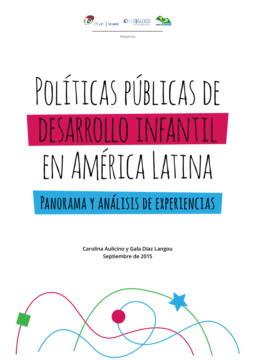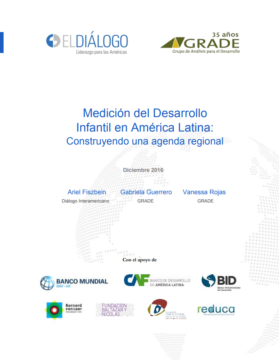
An Agenda for Early Childhood Development
Early childhood development is one of the investments with the highest returns and allows us to achieve, simultaneously, equity and efficiency objectives.
This post is also available in: Español
In order to promote the adoption of better policies that promote the development of young children, the Regional Agenda for Early Childhood Development was signed in Bogota on November 2017. The Agenda, which was endorsed by 22 representatives from different sectors across 11 countries, defines four areas in which participants agree to prioritize their efforts: (1) Multi-sector planning and financing, (2) Improving the quality of early childhood development services, (3) Measuring early childhood development, and (4) Collaboration and alliance building.
In accordance with this agreement, and in order to measure the progress made in alignment with the Agenda, an instrument for assessing the state of early childhood policies was collaboratively developed using the Bogota Declaration agreements as a reference. Between 2018 and 2020, research centers in ten countries, together with the Inter-American Dialogue’s Education Program, developed national reports to monitor the progress of compliance with the agreements on the agenda of each country over time.
In 2020, the Inter-American Dialogue published the First Regional Report summarizing the main findings of those ten reports in terms of the four agreements, recognizing opportunities for improvement and above all, highlighting the strengths of different countries in each of the areas.
In 2023, the Dialogue invited the signatory countries of the agenda to evaluate the progress in the implementation of the agreements. With the same instrument used between 2018 and 2020, through a participatory process, eight countries (Brazil, Chile, Colombia, Guatemala, Honduras, Mexico, Peru and the Dominican Republic) developed their second national report (2024) that allowed them to observe the progress of compliance with the agreements of the agenda over time.
This Second Regional Report analyses the main results of these eight reports, which describe the changes, progress, setbacks and stagnation of the last four years. This regional report aims to inform governments and citizens about the status of early childhood policies and compliance with each agreement of the Bogotá Declaration, as well as highlight good initiatives that could serve as an example for other countries.
Multi-sector planning and financing: At the level of coordination and leadership of early childhood policies in the region, we see, on the one hand, the creation of new institutions such as Undersecretariats and cabinets, on the other, the weakening of the institutions that govern policies in certain countries. Something common in most reports is the perception of a lack of political power of the institutions that coordinate policies. Having effective leadership and political power that transcends changes in administration would constitute the greatest challenge in fulfilling this agreement.
Improving the quality of early childhood development services: The challenges to ensure quality early childhood services in Latin American countries are multiple and complex. A critical aspect is ensuring qualified personnel, which requires the establishment of solid and consistent training standards, as well as qualification policies and ongoing support. This is essential to maintain and improve the quality of services provided. However, it is an aspect in which no country has identified clear progress in recent years.
Measuring early childhood development: Monitoring early childhood development in Latin America faces several challenges. Training evaluators is essential to ensure the quality and consistency of the data collected. Without well-trained evaluators, measurements may not be reliable or comparable across regions. Another significant challenge is systematizing data and using it to inform public policy. Data must be integrated and analyzed in a coherent manner so it can be effectively used in policy formulation and evaluation. In addition, updating early childhood development measurement instruments is crucial; these must reflect the latest research and be appropriate for local contexts to ensure the relevance and accuracy of assessments.
Collaboration and alliance building: Since 2018, there has been a mixed picture of collaboration between civil society and governments on early childhood policies in Latin America. Although comprehensive policies in the region still lack binding mechanisms for civil society participation, early childhood networks and their advocacy capacity have been strengthened, which has had a positive impact on public policies. Considering the common challenges of the region, Somos Crianza, a Latin American coalition that brings together early childhood networks from Brazil, Colombia, Ecuador, Chile, Guatemala, Mexico and Peru, was formed in 2023.
Early childhood development is one of the investments with the highest returns and allows us to achieve, simultaneously, equity and efficiency objectives.
Measuring early childhood development (ECD) at the national level is crucial for informing policy-making and for evaluating ECD programs in Latin America.
La importancia de los primeros años de vida sobre la formación del capital humano es ampliamente reconocida. ¿Cómo podemos asegurar una oferta de servicios de calidad?
 Tapa Informe Regional
Tapa Informe Regional

